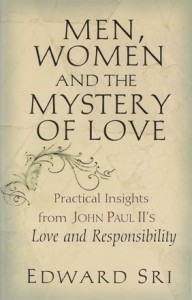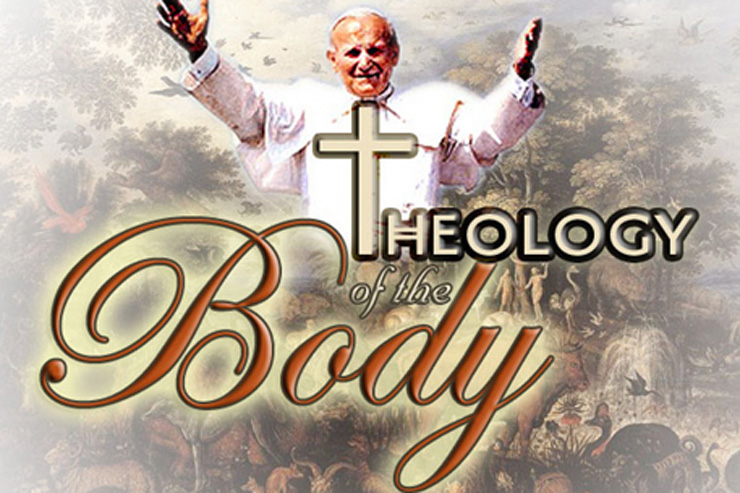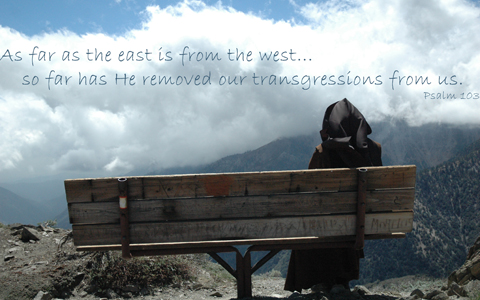It is routinely pointed out that about half of all marriages end in divorce. But what is not often discussed is the other half of the equation: the marriages that don’t break up. Are those marriages thriving? Do married couples that stay together feel truly close to one another? Do they achieve true, lasting, personal intimacy?
The picture on this other side of the divorce line is not a pretty one. Studies have shown that most couples do not feel as if they are married to a close friend. In fact, only about 1 out of 10 married couples in America say they experience emotional intimacy in their relationship.
A great marriage is not one that simply stays together. A great marriage is one in which spouses experience deep personal communion with each other. We want marriages in which people 10, 20, 30 years into their married life can say, “I love my spouse more now than I did when we were first married.”
For Pope John Paul II — then Karol Wojtyla — the key to personal communion in married life is mutual self-giving love and the accompanying sense of responsibility for each other as a gift. Indeed, this theme of responsibility is so important that he put it in the title of his book about love, marriage, and relationships between men and women. The book is not called simply Love, but Love and Responsibility.
What is this responsibility? And how can it transform relationships between spouses, fiancés, and “significant others”? That’s what we will explore in this reflection.
Responsibility
Think about what happens in betrothed love. In our last reflection, we saw that the fullest sense of love involves two people giving themselves to each other. And this self-giving is nothing less than a total entrusting of one’s self to the other person — a surrendering of one’s own preferences, freedom, and will for the sake of the other.
This means that in betrothed love, my beloved totally gives herself to me. She freely and lovingly gives up her autonomy and commits her will to the good of our marriage and the good of our family. Therefore, since my beloved completely entrusts her life to me in this unique way, I must, in turn, have a profound sense of responsibility for her — for her well-being, her happiness, her emotional security, her holiness. As Wojtyla explains, “There exists in love a particular responsibility — the responsibility for a person who is drawn into the closest possible partnership in the life and activity of another, and becomes in a sense the property of whoever benefits from this gift of self” (p. 130).
Here, Wojtyla offers a standard for love that is counter-cultural: “The greater the feeling of responsibility for the person the more true love there is” (p. 131). Notice how he didn’t say the more powerful the emotions, the more powerful the love is. The true measure for love is not how much one enjoys being with his beloved or how much pleasure he receives from her. Authentic love is not so self-centered, constantly looking inward at my own emotions and desires. Rather, true love looks outward in awe at my beloved who has entrusted herself to me, and it has a deep sense of responsibility for her good, especially in light of the fact that she has committed herself to me in this way.
Accepting the Gift
In order to help us better appreciate the crucial role responsibility plays in a relationship, let’s consider the two aspects of self-giving love. On one hand, there is the giving of self: My beloved gives herself to me and I give myself to her. On the other hand, there is the acceptance of the other person: I accept my beloved as a gift that has been entrusted to me, and she accepts me as a gift. Wojtyla notes how in betrothed love there is a great mystery of reciprocity in the giving and the receiving of each other. In fact, he makes a very intriguing statement about this: “Acceptance must also be giving, and giving receiving” (p. 129).
How is acceptance giving? In other words, in what sense is the acceptance of my beloved an actual gift to her? The insights from John Paul II’s Theology of the Body will be helpful here.1 While commenting on the marriage of Adam and Eve, he explains that when Eve was first given to Adam, she was fully accepted by him, and the two became intimately united as one. “Then the man said, ‘This at last is bone of my bones and flesh of my flesh.’ . . . Therefore a man leaves his father and his mother and cleaves to his wife, and they become one flesh” (Gen. 2:23-24).
Because sin had not yet entered the world, Adam did not struggle with selfishness. Thus, he loved his wife not for what he could get out of the relationship (a coworker in the garden, companionship, emotional pleasure, sexual pleasure, etc.). Rather, he loved her for who she wasas a person. He accepted his wife as a tremendous gift that he would treasure and care for. He had a profound sense of responsibility for her, and he always sought what was best for her, not just his own interests. He never did anything that would hurt her.
The Key to Intimacy
Put yourself in Eve’s shoes. Imagine having a spouse like that! Imagine how she must have felt being totally accepted in this way. Indeed, having a husband joyfully receive her as a gift and love her for her own sake was a great gift to her, for now her longing for personal communion could be fulfilled. Adam’s total acceptance of Eve provided her with the security she needed to feel safe enough to entrust her heart, indeed her whole life, fully to him without any fear of being let down. In other words, his committed love and acceptance of her fostered in her the trust that makes emotional intimacy possible.2
This is the key to personal communion in marriage. Since Eve had complete trust in Adam’s love for her, she never felt afraid of being used by him, being misunderstood by him, or being hurt by him. Therefore, in this context of committed love and responsibility, she felt free to give herself fully to her husband — emotionally, spiritually, physically — holding nothing back.
Back to the Garden
This is the kind of dynamic we want for our marriages: one of total trust, which makes personal intimacy possible. However, my beloved will grow to trust me — and thus unveil her heart to me — only to the extent that she senses that I am committed to her, that I totally accept her, and that I feel great responsibility for what is best for her.
This is not an easy thing to achieve. Unlike Adam and Eve in the garden, we are fallen. We are selfish, and we often do things to hurt one another that can break down trust and thus hinder intimacy. For example, when a man is more preoccupied by what he needs to do at work than he is about caring for his wife’s needs, he sends a message to her that she is not a priority — that everything else is more important. This, of course, does not help build trust and only makes her feel more distant from her husband. Similarly, a wife who constantly nags her husband and criticizes him for his weaknesses, for not getting things done around the house, or for not having a better job, may make him feel disrespected or unappreciated. Such complaining will likely only drive him farther away from her emotionally.
What about when we experience firsthand our beloved’s weaknesses and feel hurt by something they have done? When we’re hurt, we’re tempted to get frustrated with our beloved, saying to ourselves, “Why does he always do this? He is never going to change!” We may become defensive (“This was not my fault! Why doesn’t she understand?”). We might put up walls (“I’m not going to tell him what I’m really feeling anymore. . . . He doesn’t care anyway”). We might even begin to withdraw our love (“If I had married someone else, I know I wouldn’t be treated this way”).
Wojtyla reminds us that in moments like these, our acceptance and responsibility for the other person is tested the most. Still, we should “love the person complete with all his or her virtues and faults, and up to a point independently of those virtues and in spite of those faults” (p. 135). He is not saying we should condone or ignore the sins and weaknesses of our beloved. But he is challenging us to avoid viewing our beloved through the lenses of a prosecuting attorney. Even though we are hurt, we need to look beyond the mere legal facts (“She did this to me!”) and see the person, who maintains great value even in the midst of their shortcomings and sins. After all, as we have seen throughout these reflections, true love is directed to the person — not just what he or she does for me. So when the beloved is having a not-so-beautiful moment — is not pleasing to me and in fact does something to hurt me — will there still be total love and acceptance for him or her?
This is the kind of question that gets at the real measure of one’s love. As Wojtyla sums up,
The strength of such a love emerges most clearly when the beloved person stumbles, when his or her weaknesses or even sins come into the open. One who truly loves does not then withdraw his love, but loves all the more, loves in full consciousness of the other’s shortcomings and faults, and without in the least approving of them. For the person as such never loses its essential value. The emotion which attaches itself to the value of the person remains loyal to the human being.” (p. 135)
This, of course, is analogous to the way the Lord loves us. Despite our many sins and failures, God remains committed to us, looking at us patiently and mercifully in the face of our faults. He puts up with us even when we do things that hurt our relationship with Him.
Therefore, if we wish to be more Christ-like in our marriages, we must first and foremost develop a deeper attitude of love and acceptance for our spouses as they are, with all their imperfections. Instead of trying to change them or becoming irritated with their faults, we must remain firmly committed to them as persons who have been entrusted to us as a gift. Our fundamental attitude toward our beloved in the midst of their weaknesses must not be one of agitation, defensiveness, or annoyance, but one of unwavering acceptance in our hearts for our spouse as he or she is, bearing patiently with his or her faults. When we do this, we begin to love as God loves.
Endnotes
- See John Paul II, The Theology of the Body: Human Love in the Divine Plan (Boston: Pauline Books & Media, 1997), especially pp. 54-72.
- While I have focused on Adam’s acceptance of Eve in this short reflection, the same could be said in the other direction. Eve’s total acceptance of Adam as a gift similarly serves as a gift for him, further strengthening trust and intimacy in their relationship.
Acknowledgement
(This is the sixth in a series on Pope St. John Paul II’s Love and Responsibility)
 If you enjoyed this article from Edward Sri’s series on Blessed John Paul II’s, Love and Responsibility, and want to learn more about theology of the body, see his book, Men, Women and the Mystery of Love: Practical Insights on John Paul II’s Love and Responsibility (Servant Books).
If you enjoyed this article from Edward Sri’s series on Blessed John Paul II’s, Love and Responsibility, and want to learn more about theology of the body, see his book, Men, Women and the Mystery of Love: Practical Insights on John Paul II’s Love and Responsibility (Servant Books).
All references in this column to Pope St. John Paul II’s Love and Responsibility are taken from the 1993 edition, published by Ignatius Press.
Reprinted with permission from the November/December 2005 issue of Lay Witness magazine. © 2005 Catholics United for the Faith / www.cuf.org/Laywitness/index.asp
If you liked this article, please share it with your friends and family using the Recommend and Social Media buttons below and via email. We value your comments and encourage you to leave your thoughts below. Thank you! – The Editors















